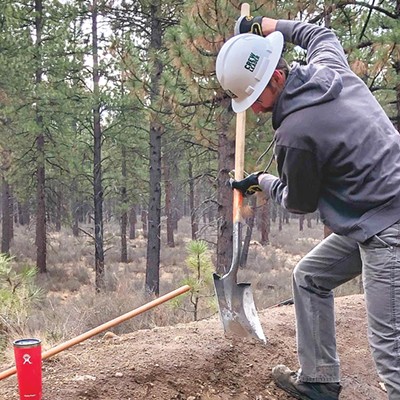Last year, Washington state voters approved same-sex marriage, legalized marijuana and ended the state's decades-long liquor-sale monopoly. While such changes may seem like some fantasyland for progressives, rife with dancing unicorns and hookah-puffing caterpillars, in fact, the legislative changes really are more mainstream than radical. As part of a swelling trend, Washington joined 13 other states and the District of Columbia in legalizing same-sex marriage—a trend double-underscored by the U.S. Supreme Court decision in June rolling back the Defense of Marriage Act and opening the door wide-open for coast-to-coast constitutional rights for same-sex couples. And, while Washington was one of only two states to legalize pot on the state level, the federal government has responded with declarations that its agents will not prosecute growers, sellers and smokers.
Moreover, these changes—and the effects they have had over the past year—are an indication of what life soon may look like in Oregon. It is likely that next year's elections will include both a voter initiative to legalize marijuana and a challenge to the state's constitutional ban on same-sex marriage. And, the Oregon Liquor Control Commission, under fire from detractors for years, may be considering cultural and jurisdictional changes akin to what Washington has undertaken.
To see what Washington looks like now, a year after its changes took root, and, to glimpse into a crystal ball for Oregon's potential future, we talked to lobbyists, politicians and professors.
Marriage equality
When 28-year-old Blaine Stum was growing up in Spokane County, he didn't know many out gay people. "The LGBTQ community was very closeted at the time," said Stum. "Spokane has tended to be more conservative than most other major cities in Washington. Growing up especially, no one really talked about it, and when they did, it was a lot of vitriol. It made people afraid to be out."
A legislative aide to Spokane City Councilmember Jon Snyder, Stum waited until after high school to come out. He currently also sits on the Board of Directors for OutSpokane, the group that organizes the local Pride celebrations. But by the time Washington's campaign for marriage equality, Referendum 74, came to Spokane in 2012, attitudes had shifted since Stum's childhood—so much so that the campaign won the city, even though it lost the county. Stum, who also served on the executive committee for Washington United for Marriage, the organization leading last year's campaign, attributes changing attitudes to more LGBTQ people coming out and having conversations with their loved ones. "I phone banked and canvassed quite a bit. I was surprised, you'd often hear they had a gay son, uncle, or nephew, and were supportive because of that," he said. "It highlights how important it is to be out." On the whole, Stum said he encountered a "live and let live" attitude—especially from younger generations, but also from the "65 and over crowd," who tended to take the stance that other people's marriages were none of their business.
Though just shy of year since the passage of marriage equality in Washington, Stum said that the measure is pushing those ripples even further into the community.
"Now that marriage has become legal, I've seen a shift in the perspective that people just see marriage as an overall good for the community, where as before it was segregated," he noted. "It's become so much more normal now. That's a good thing. That's what we were hoping for. I love seeing it just become a thing that people do."
That quiet acceptance is contributing to an environment in which younger generations feel increasingly safe coming out and in which businesses, both mainstream and niche, are vying for a piece of the action.
As Spokane's 2013 Pride festivities approached this summer, Stum said the Spokane Convention Center contacted OutSpokane expressing interest in hosting a same-sex wedding on its rooftop. But it's not just the local LGBTQ community that's benefiting from Washington's new law. Same-sex couples from states across the country where marriage is not yet legal have been traveling to Spokane, and other cities across the state, to wed. While the city of Spokane doesn't officially track the number of marriage license applications by same-sex couples, The Spokesman recently reported that a study of marriage records indicates about 74 out-of-state same-sex couples have made Spokane their wedding destination—about one wedding every third day. Most have come from neighboring states like Montana and Idaho.
With an average wedding laying out $25,000—especially if it is an out-of-state wedding with lots of travelers—likewise, Bend could financially benefit from an influx of same-sex wedding parties from around the state and country—especially because it is likely that Montana and Idaho, with traditionally socially conservative blocks, are likely to be years away from permitting same-sex marriages.
But, whether shifting political views and the promise of an economic boost are enough to sway voters is difficult to predict. Despite similarities between Oregon and Washington's demographics, there are real differences in the challenges faced by their respective campaigns for marriage equality.
Washington United for Marriage's Yes of Referendum 74 campaign was placed on the ballot after the state Legislature approved the measure—essentially an endorsement. In Oregon, citizen advocates aim to gather enough signatures to put the measure on the ballot directly. Moreover, it has an extra high hurdle to overcome: It must overturn an existing constitutional ban approved by voters in 2004. While that does not require any additional voter support, it does create a potential psychological barrier.
"Ours is a proactive campaign—one we're looking to put on the ballot," explained Oregon United for Marriage Communications Director Amy Ruiz. "So we're able to work on our own timeline—which you saw play out in the decision of when to go to the voters."
Currently, the campaign is putting boots on the ground to mobilize volunteers across the state—including in Central Oregon—to gather the requisite signatures. If their efforts succeed in getting voters fired up about marriage equality, perhaps the only crystal ball they need is public opinion.
Washington's campaign started with about 53 percent support and ended with 53.7 percent voting yes. Oregon already has 54 percent. So while same-sex marriage will be a hot-button issue between now and the November 2014 election, it may soon shift to being no big deal–except to those reaping the benefits.
Marijuana
Anyone who doubts that marijuana will soon be legal in Oregon, as it now is in Washington and Colorado, should simply Google, "Oregon, pot." There is another news story nearly every day—which is to say: The momentum to legalize marijuana is building thanks in part to continued advocacy and careful regulation from the two states that have already legalized the drug.
Last week, the legalization movement took another step forward when Attorney General Eric Holder informed Washington Gov. Jay Inslee that the Department of Justice would allow his state to move forward with its voter-approved initiative that legalized marijuana for adults. That was good news for all those who voted in favor of Washington's Initiative 502, which passed on Nov. 6, 2012, and went into effect 30 days later.
In fact, marijuana legalization is starting to make such good sense that even conservatives are getting on board. Just last week, an Arizona Daily Star columnist quoted U.S. Sen. John McCain (R-Ariz.) as saying, "Maybe we should legalize," while referencing marijuana during a town hall event in Phoenix.
In Oregon, pot proponents say we're close.
"We are confident we'll have the funding to get on the ballot and win in 2014," said Anthony Johnson, director of New Approach Oregon, a Portland-based advocacy group.
But there is still a long way to go, even for our neighbors to the north who have already taken a giant step in that direction. For example, adults can now possess up to an ounce of green, though there is still no legal place to buy it (and likely won't be until at least late winter 2014). Only last week did the Washington State Liquor Control Board, the state agency that's responsible for taxing and regulating marijuana, roll out its specific rules. Still, progress has been steady and Washington's carefully constructed marijuana-market road map has won the respect of law agents and elected officials.
Oregon would be wise to borrow the map and plot a similar path.
Why? First off, there's money to be made. According to predictions from the Washington State Liquor Control Board, taxes on marijuana (which are significant; it is taxed 25 percent at each point of sale, from the grower, to the wholesaler to the consumer) could mean up to a $2 billion infusion for Washington's general fund over five years. That is an impressive number, especially considering that Oregon's budget shortfall last year was $3.5 billion. Doesn't legalizing and taxing pot sounds a lot better than another education or health care budget cut?
Secondly, there's not much to be afraid of: It's not like Washington's joint-wielding stoners are picking up dime bags at the corner Trader Joe's and puffing in the parking lot. In Washington, smoking is only allowed in private.
What has changed is that marijuana will be available for purchase for adults 21 and over from licensed retailers. Those licenses will become available in December and pot shops should follow in the months after (predicted average retail price is $12 per gram). There will be no Amsterdam-like smoking bars (although, there may be some private clubs). Much like now, toking will be done in the comfort of one's living room—minus the fear of getting busted.
Furthermore, Washington, which figures that nearly 22 percent of its residents already smoke marijuana, has created numerous safeguards against consumption by minors and general abuse. Retail outlets aren't allowed within 1,000 feet of schools, playgrounds, parks or other places that attract children. Advertising, which is allowed, is also limited by the 1,000-foot rule. There are production and retail limits, too. Washington has capped the number of pot shops at 334 statewide. A city like Spokane which, with a population of 210,000 (roughly 2.5 times more residents than Bend) will only be allowed eight retail outlets. Furthermore, no retail shop can be part of an existing store, so don't expect to see strains of Northern Lights for sale at Fred Meyer.
Basically, Washington has taken on a massive chore, unfurling complicated moral and legal constraints, and navigating uncharted territory between conflicting state and federal rules. But it is doing it right—and, it all started with I-502's thoughtful and careful language.
"The proposition was very well designed to pass," said Mark Kleiman, professor of public policy at UCLA. Kleiman is acting as the state's principal consultant, advising state officials on how to make pot work in Washington.
"The way to think about it is you're trying to provide cannabis to adults who want to use it responsibly," added Kleiman. "And you want to minimize the amounts that are used by kids and people who use too much of it."
This is the very task Oregon lawmakers have been grappling with for years. Measure 80, which would have legalized and taxed marijuana in Oregon, was defeated at the ballot box last November. But now, advocates are working toward legalization within the next legislative session—a month long session in February—and if that doesn't work, they are prepping a ballot initiative for November 2014. They already have the support of the chair of the House Revenue Committee, Rep. Phil Barnhart (D-Eugene), as well as Rep. Peter Buckley (D-Ashland).
"It's time to end the stupidity of the prohibition around marijuana," Buckley said in an interview with the Source. "I have a lot of motivation to get this done." The state representative outlined a key component to following in Washington's green footsteps: a broad support base.
"One reason I think the Washington measure passed is they spent a lot of time getting law enforcement to support it," Buckley said.
Kevin Oliver, who's on the national board of directors of the National Organization for the Reform of Marijuana (NORML) and the Washington NORML executive director, agrees. Oliver worked hard on I-502, is happy with what's been achieved ("the edge is gone," he said) and offers this advice to Oregon: "There needs to be a wider consortium of support—it's got to have that soccer mom contingent," said Oliver, before going further. "There needs to be a social benefit—social reform that benefits the tax base and keeps kids out of jail."
Johnson, of New Approach Oregon, thinks at least some of that support will come from like-minded voters.
"A lot of the supporters who support same-sex marriage also support ending the prohibition on cannabis," said Johnson.
Booze
It has been a busy year for Brian Smith, a communications director at the Washington State Liquor Control Board, the government agency in charge of taxing, regulating and controlling Washington's new marijuana market.
On Nov. 6, 2012, Washington voters passed Initiative 502, which not only legalized the possession of marijuana for adults 21 and over, it also put the LCB in charge. Interestingly, during that same voting cycle, Washingtonians also wrestled a 78-year-old liquor monopoly away from the state and, as of June 1, 2012, bottles of Maker's Mark could be found at Safeway—as well as all types of booze in privately controlled outlets. Smith and the LCB had little time to transition from liquor contractor to marijuana regulators.
"We laid off over 900 people—two-thirds of our agency," Smith explained. "We had six months to shut down a billion-dollar industry and start preparing [for I-502]."
But the LCB had accepted its fate long before Washington voters voted for privatization.
"We could see the polling was favorable for 502," said Smith. "When it did pass we hit the ground running." To prepare for a transition that seemed inevitable, the LCB pulled together research teams, established contact with Colorado (which was also in the process of legalizing marijuana) and consulted with the Department of Health.
The Oregon Liquor Control Commission, which was created at the end of prohibition as a way to achieve state control over liquor sales, may soon find itself a similar position.
The outmoded agency has been home to a number of gaffs and scandals. The OLCC only recently replaced its director after the governor forced Steve Pharo, a director who came to power after the former executive resigned after a drunk-driving accident. And, who can forget the Jason Evers scandal, when an OLCC employee was discovered to have been using the name and identity of a murder victim? And, what about that Salem-based OLCC liquor license inspector who this winter pleaded guilty to sexually harassing a 14-year-old girl? And, more recently, local allegations of secretly recorded internal meetings by the regional director currently pending with the DA's office?
On top of all that—and perhaps more importantly—private businesses, and big grocers in particular, are growing weary of the OLCC's stronghold on hooch. All that turbulence is preface to a potential ballot measure in November 2014 when Oregon voters may get a chance to follow Washington's lead and end the OLCC's liquor monopoly.
"We're getting very serious about doing something for 2014," Joe Gilliam, president of the Northwest Grocery Association, told The Oregonian earlier this summer.
In another sign of OLCC uncertainty, newly appointed chairman Rob Patridge was recently quoted in the Mail Tribune as saying the current board is facing a "cultural change," hinting that should marijuana become legal in Oregon, the OLCC may become its regulating body.
Again, like same-sex marriage and marijuana legalization, Washington could provide the blueprint. If that is the case, Oregonians should prepare for a small price hike as their favorite bottle is likely to cost more at a grocery store. In Washington, the average jump was roughly $2 for a 750 ml bottle, once new taxes and fees were accounted for.
Still, according to The Columbian, liquor sales are up nearly 8 percent since privatization. And the social mayhem predicted by privatization doubters? Didn't happen. Though it may be too early for such a study, a report from the West Seattle Herald that looked at two regions before and after privatization shows alcohol-related crimes actually dropped after privatization.
Rather than balk at the massive task ahead, Smith and his LCB associates continue to plug along, methodically transforming a state liquor agency into a marijuana control board.
"This agency has embraced it," Smith said.
























